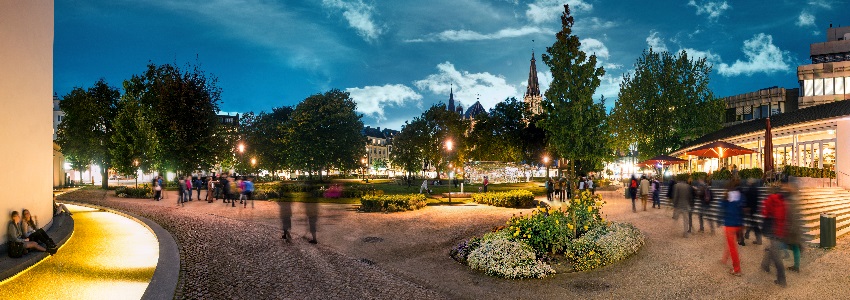Declaration by the Board of Directors of the Society for the Conferring of the International Charlemagne Prize of Aachen on the EURO - for which the European Central Bank stands as its custodian
 By the will of its initiators, the International Charlemagne Prize of Aachen is to be awarded for outstanding contributions to the cause of European understanding and common endeavour, of humanity and world peace. It is to honour the fostering of United Europe with regard to politics, economics, culture, and the mind and spirit. The new currency, the EURO, will further identification with Europe to a degree unmatched by any other step taken before in the direction of integration. The EURO therefore renders a decisive, epoch-making contribution to the growing unity of the family of nations.
By the will of its initiators, the International Charlemagne Prize of Aachen is to be awarded for outstanding contributions to the cause of European understanding and common endeavour, of humanity and world peace. It is to honour the fostering of United Europe with regard to politics, economics, culture, and the mind and spirit. The new currency, the EURO, will further identification with Europe to a degree unmatched by any other step taken before in the direction of integration. The EURO therefore renders a decisive, epoch-making contribution to the growing unity of the family of nations.
The awarding of the International Charlemagne Prize of Aachen to the EURO - for which the European Central Bank stands as its custodian - also honours the outstanding service of all those personalities who despite manifold resistance have remained true to the vision of a common currency for United Europe and made it reality. With the EURO, the Board of Directors of the Charlemagne Prize honours an initiative that has a stabilizing effect on the Community, supports a common foreign and security policy, and forms the basis for a coordinated economic and social policy as well as for other Community policies. The introduction of the EURO thus lays the groundwork for a new stage in the process of European unification.
To European integration we owe the longest period of peace in our history. The fact that on the European continent war and dictatorship, totalitarian ideologies and division were conquered, that peace, freedom, understanding and reconciliation prevailed, may be owing to a variety of causes. But without the central place occupied by the idea of European unification, this positive development would not have happened.
An essential building block for this United Europe is the European Economic and Monetary Union. It has helped our continent - with so many peoples and nations, languages and cultures - to grow more closely together than ever before. And this integration has been voluntary, evolving in peace and freedom - a rare moment in Europe’s millennia-spanning history.
When the Monetary Union was launched more than a decade ago, it was considered by many to be an illusion. In fact, however, with the Treaty of Maastricht and with the founding of the European Central Bank on 1 June 1998, the common efforts undertaken in the second half of the 20th century proved their worth. At the end of the century, the great visionaries turned out to be the true realists.
Since the founding of the European Communities, no step towards integration has had such a profound effect upon people’s lives as the EURO will prove to have - by the beginning of 2002 at the latest. When people in the Algarve and in Dublin, in the Bretagne and in Burgenland, in Lapland and in Sicily - to name but a few regions - pay in the same currency, they will literally be taking Europe at face value, carrying its coin in their purses; they will literally be able to grasp that Europe is an organic whole and that the EURO is a symbol of this. The EURO is the most convincing and pragmatic solution on the way to European common ground in more than 1200 years.
With the conferring of the International Charlemagne Prize in 2002, we are reflecting the conviction that it is precisely the EURO from which will grow a totally new feeling of togetherness in the European Union. Historically, currencies were always more than mere instruments of payment; they were and are always a tangible example of common identity and culture and a gauge of political, economic and social stability. Stability isn’t everything; but without stability, "everything" is nothing.
To put the historical dimension of the challenge into realistic perspective, it may suffice to note that since the signing of the Treaties of Rome and the beginning of the European Community, there had always been the envisioned aim of a common currency, an economic and monetary union, as the culmination of the Common Market. Yet unification did not by any means advance along a straight line. There were many initiatives that proved unable to really move integration forward. That goes for the action programme developed back in the sixties by the EEC Commission for the second stage of the customs union, as well as for the plans based on the Werner Report in 1970 when in the face of the collapse of the fixed exchange-rate system of Bretton Woods, efforts to achieve more stability were launched. Serious progress did come when the European Monetary System took effect in 1979, resulting in a zone of increasing monetary stability.
The introduction of the EURO, agreed 13 years later in the Treaty of Maastricht, is also one of Europe’s great answers to the globalization of the world economy and to increasingly strong worldwide competition between the national economies. The monetary union increases price transparency and does away with exchange-rate risks between the participating countries. This means: more planning security; new entrepreneurial opportunities; the development of long-term business relations not subject to currency-market fluctuations; and finally, a large and highly efficient and productive European finance market with an EU-wide gain in social and economic security.
But the EURO is not a unit of value alone -it is also a standard of value; above all it produces an identity-creating effect, and perhaps even a peace-creating effect. Those who travel in future from France to Greece, from Austria to Finland, from Luxembourg to Portugal, from Belgium to Ireland, from Spain to the Netherlands, and from Germany to Italy, will find via the EURO a "bit of home" also beyond national borders.
Symbolizing the common currency and standing as guardian of its stability is the European Central Bank with its President Wim Duisenberg, who representing the EURO will accept on 9 May 2002 the International Charlemagne Prize of Aachen.
The conferring of the International Charlemagne Prize of Aachen in 2002 reflects the hope and expectation of the Charlemagne Prize Board of Directors that the common currency will bring the people of our continent still closer together, that the identity- and peace-creating effect of the EURO will exert an even stronger pull on the states and nations that have not yet introduced the common currency as well as on those that do not yet belong to the Community, and that the irreversible monetary union will give a decisive impetus to the completion of the Political Union.




